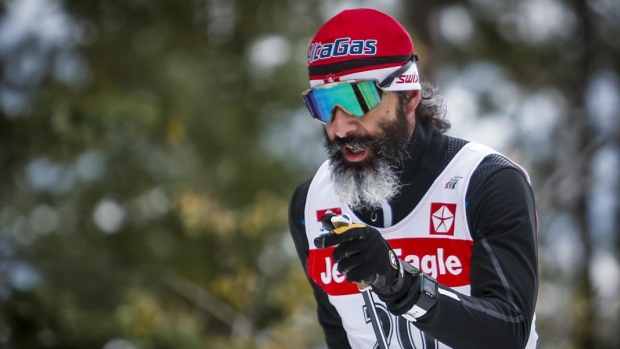Mar 1, 2022
Decorated skier McKeever to bow out after Beijing
Beijing's Winter Paralympic Games will be the sixth and the last for 13-time gold medallist Brian McKeever. Canada's most decorated Winter Paralympian has not only amassed a total of 17 medals in cross-country skiing since 2002.
The Canadian Press

Beijing's Winter Paralympic Games will be the sixth and the last for 13-time gold medallist Brian McKeever.
Canada's most decorated Winter Paralympian has not only amassed a total of 17 medals in cross-country skiing since 2002. The 42-year-old from Canmore, Alta., also helped reshape how Canadians and the world view athletes with a disability.
The 2022 Paralympic Games open Friday. McKeever is among 49 athletes representing Canada in hockey, curling, alpine and Nordic skiing and snowboarding for 10 days.
The visually impaired skier was the first Canadian to be named to both Olympic and Paralympic teams in 2010. He qualified to race the Olympic 50 kilometres in Whistler, B.C.
McKeever was heartbroken when he wasn't chosen to compete in it. He knew what it would have meant to the Paralympic movement if he had.
He went on to win three Paralympic gold medals in Whistler with his brother Robin guiding him.
The siblings combined for 10 medals, including seven gold, before Robin retired and made way for other guides.
The brothers were featured just last month in an automaker's Super Bowl advertisement.
"The Paralympic movement is an important one because it's about respect," McKeever told The Canadian Press.
"When we started, Robin and I didn't know this, but Paralympics stands for 'parallel Games.' It's not paraplegic and most people don't know that, so we also have a bit of a marketing problem.
"If I can leave something behind, I hope it is that we made Paralympics more visible. We made the movement more visible. We helped to show that there was parity, certainly at the highest levels between Olympics and Paralympics, by qualifying for both Games."
McKeever, a 20-time world para champion, was the first Canadian athlete with a disability to ski in an able-bodied race when he competed in the 2007 world championship in Sapporo, Japan.
McKeever can add more hardware to his Paralympic medal chest in Beijing.
He'll race the 20k on Monday (9 p.m. ET Sunday), the sprint March 9, the 12.5k on March 12, and possibly a relay to close out the Games on March 13.
"This is definitely my last Paralympic Games as an athlete," he said. "I'm getting creaky in the joints. I'm coming to the realization my body won't handle any more."
A cross-country skier from the age of three, a teenaged McKeever contracted Stargardt's disease, which is an inherited macular degeneration that also claimed his father's eyesight.
McKeever was left with 10 per cent vision, and all of it peripheral.
"I see the doughnut, but not the Timbit," he once explained.
McKeever continued to train at the Canmore Nordic Centre with the help of Robin, who raced for Canada in the 1998 Winter Olympics.
Brian's ability to log volumes of high-intensity workouts makes him a standout among para and able-bodied skiers alike.
His workload was also the tool to building a big engine necessary in an endurance sport.
"It takes years and years to build that base. I like the work," he said. "I like racing too, but I really like the work."
Russell Kennedy is one of two McKeever guides in Beijing alongside Graham Nishikawa. The duo helped McKeever achieve another gold-medal hat trick in 2018 in Pyeongchang, South Korea.
"He's been racing at such a high level for so many years," Kennedy said.
"How has he continued to get the motivation to go year after year and continue winning? When you have that kind of passion and love for the sport, you don't need to look for external sources for motivation."
McKeever's teammate Mark Arendz won a record six medals in cross-country and biathlon in Pyeongchang. The 31-year-old amputee from Hartsville, P.E.I., will pursue more podiums in Beijing.
"Brian's had a huge influence right from the beginning," Arendz said. "How to approach a lot of the training and really make the difference in the off-season and not always focus on just the racing season, I've learned a lot of vital things from him, critical things."
Paralympic medals are harder to win now than they were two decades ago because fields are stronger and deeper, McKeever said.
"That's the way it should be," he said. "When I started out, there were far fewer people in all of the sports.
"We were basically chasing warm bodies to fill teams. Now, you have to be exceptional."
